Yoga is an extremely effective way for swimmers to address imbalances in the body. In this article you will learn six yoga poses that can help swimmers create balance in the upper body.
One of the most common imbalances seen in swimmers is between the front and the back of the upper body. The demands of training in the water can cause the overdevelopment of the front of the body (anterior) and the underdevelopment of the back of the body (posterior).
The result of this imbalance is often a rounded shoulder posture. The development of this posture can leave a swimmer vulnerable to injury. It can also negatively affect your performance by compromising breathing function (Han 2016) as well as limiting strength and range of motion (Sanders 2011).
Upper Crossed Syndrome
Many swimmers experience tightness in the pecs (major and minor) as well as the upper traps and latissimus dorsi. This is because of the demands put on these muscles when creating propulsion in freestyle, butterfly and backstroke.
When these muscles become tight the neck flexors as well as muscles in the upper back (rhomboids and serratus anterior) are often inhibited and typically weak (Kim 2019). Working on lengthening and releasing through the chest and shoulders while strengthening the upper back is an effective way to address rounded shoulder posture (Kluemper 2006).
Yoga to Balance the Upper Body
To develop greater power in the water you need to strengthen the muscles that create propulsion, but balance is the key. Performing exercises that strengthen muscles in a manner that will benefit a certain skill or task is known as transference (McLeod, 2010).
The yoga poses below help swimmers develop a type of strength known as isolation. This type of strength training targets muscle groups with the goal of:
- Strengthening muscular imbalances
- Injury prevention
- Strengthening an identified weakness (McLeod, 2010)
These six yoga poses have been chosen to not only help swimmers strengthen the upper back, but also stretch and open up through the front of the upper body.
Caution
You must be aware of your own individual strength and stability. For any athlete joint stability is the number one priority. If you have joint instability focus on developing the appropriate strength before addressing range of motion.
Yoga Poses for Swimmers to Strengthen the Upper Back
Reach Back Lunge
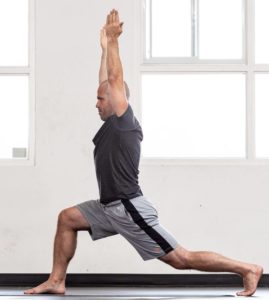

Cues:
- Start in a strong lunging position
- Front knee directly over your ankle with your knee and foot pointed straight forward
- Torso directly over your hips
- Arms extended overhead with the palms turned towards each other
- Square your hips by feeling as if you are dragging your feet towards each other without actually moving them
- On an exhale lean forward and reach your arms back behind you
- Energize through your arms at the same time as drawing your shoulder blades towards your spine
- Continue to keep the chest and shoulders open
Locust
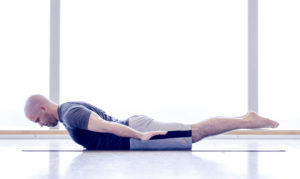
Cues:
- Start flat on your stomach with your arms by your sides and hands by the hips palms down
- Hover your nose just off the ground continuing to look down so that your neck stays long
- Bring your big toes and legs together
- Gently press the tops of your feet into the ground feeling your quads engage and your knees lift
- On an inhale draw your shoulder blades towards the spine lifting your palms off of the ground and energizing through your arms
- Continuing to feel length in your spine and on the next inhale slowly lift your legs up and off the ground using the strength in your glutes
Variation – Half Locust T/W/Y

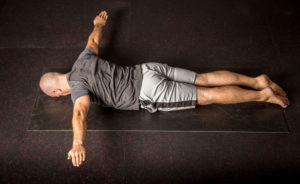
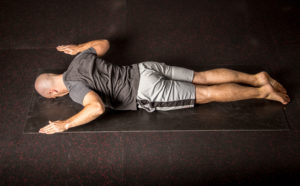
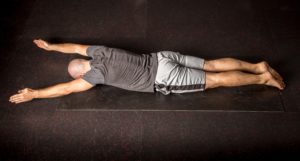
Cues:
- Start flat on your stomach with your arms by your sides and your hands by your hips palms down
- Hover your nose just off the ground continuing to look down so that your neck stays long
- Gently press the tops of your feet into the ground feeling your quads engage and your knees lift
- On an inhale draw your shoulder blades towards the spine lifting your palms off of the ground and energizing through your arms
- Keep your feet grounded and length in the spine
- On an inhale slowly bring your arms to a ‘T’ position from the shoulders focusing on squeezing the shoulder blades towards the spine
- From the ‘T’ position bend your elbows bringing them in towards your ribs forming a ‘W’
- From the ‘W’ position slowly lengthen the arms out in front of you straight from the shoulder sockets into an ‘I’ position with your thumbs up
Hands Behind the Head

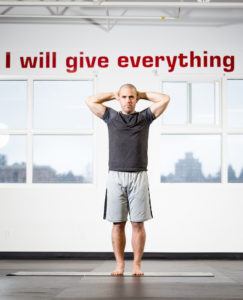
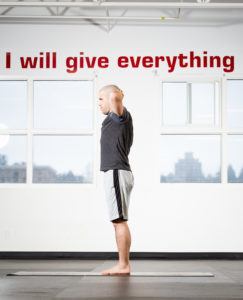
Cues:
- Start in the strong standing posture of mountain pose
- Feet hip distance apart pointing straight forward
- Hips in a neutral position
- Core slightly engage
- Collar bones wide with the shoulders relaxed
- Neck long with the ears over the shoulders
- Interlace your fingers in front of your sternum
- On an inhale keeping a neutral spine turn your palms towards the sky extending through the arms stretching both sides of the body
- Bring your hands back behind the head
- On an exhale press your head into your hands and your hands into your head
- Feel your neck engage and lengthen
- Draw the chin in
- On an inhale bring your shoulder blades towards the spine opening through the chest and shoulders while strengthening the upper back
Yoga Poses for Swimmers to Open Through the Front of the Body
Lunge with Chest Opening Twist into Extended Side Angle Variation


- Start in a lunging position with your hands on either side of your right foot
- Set a foundation in your pelvis by squaring the hips
- feel as if you are dragging your feet towards each other without actually moving them
- Set a foundation in your pelvis by squaring the hips
- Keep your left hand on the ground
- On an inhale thinking of the shoulder and arm as one unit bring the right arm up and out to the side twisting through the mid spine opening through the chest and shoulder
- Bring the arms towards being in one line across the shoulder
- Keep the shoulder stable rolling the shoulder back rather than dropping the arm back
- On an exhale bring the right hand down to the outside of the right foot
- On the next inhale bring the left arm up and out to the side twisting through the mid spine opening through the chest and shoulder
- Repeat on both sides
Heart Bed
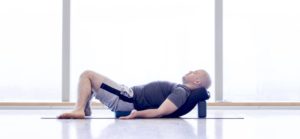
*For this pose you need a bolster and block. In place of a bolster you can use a firm cushion, a foam roller or a rolled up yoga mat. In place of the block you can use a larger text book or pull buoy.
- Place the block at the top end of the bolster
- Bring your seat to the base of the bolster
- Lie down on your back ensuring your head rests on the bolster
- Have the arms to the sides of your body with the palms turned up towards the sky
- Variations for the legs include:
- Placing the soles of the feet on the ground hip distance apart
- Having the soles of the feet on the ground mat distance apart and allow the knees rest upon each other
- Bringing the soles of the feet together and the knees out wide
- Extend the legs long on the ground
*This is a restorative pose where the intent is to allow the body to relax and sink into the support of the props letting go of tension through the front of the body. You should come into this pose anywhere from to 15 minutes.
Child’s Pose (Active)
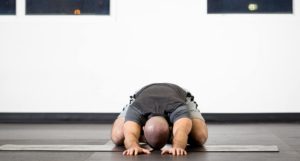

- Start on your knees with the top of your feet on the ground
- Bring your big toes together
- Your knees can be wide or placed together
- Bring your seat back towards your heels and fold forward at your hips
- Place your head onto the mat
- On an inhale walk your finger tips forward extending the arms fully feeling length come through the back
- Gently press down into your finger tips and feel as if you are pulling your mat back towards the arm pits
Variations:
a. Child’s Pose with Side Stretch

- Start in your active child’s pose
- On an inhale continuing to reach forward walk your hands and upper body over to the left side
- Allow the right side of your seat to drop back towards your right heel
- Feel length coming through the right side of the body
- Repeat on the other side
b. Melting Heart/Puppy Dog


- Begin in a table top position (on hands and knees)
- Keep your hips directly over your knees and your toes tucked
- Bring your hands a few inches past shoulder width and extend your arms forward
- Tent your fingers
- Place your finger tips on the ground with the palm lifted
- Bring your head onto the mat and start to press the sternum towards the mat opening through your chest and shoulders
- To find more depth you can bring the hands a little wider or place your hands onto blocks or pull buoys
…
References:
Han, J., Park, S., Kim, Y., Choi, Y., & Lyu, H. (2016). Effects of forward head posture on forced vital capacity and respiratory muscles activity. Journal of physical therapy science, 28(1), 128–131. doi:10.1589/jpts.28.128
Kim, J. E., Seo, T. B., & Kim, Y. P. (2019). The effect of a Janda-based stretching program range of motion, muscular strength, and pain in middle-aged women with self-reported muscular skeletal symptoms. Journal of exercise rehabilitation, 15(1), 123–128. doi:10.12965/jer.1836606.303
Kluemper, Mark & Uhl, Tim & Hazelrigg, Heath. (2006). Effect of Stretching and Strengthening Shoulder Muscles on Forward Shoulder Posture in Competitive Swimmers. Journal of Sport Rehabilitation. 15. 10.1123/jsr.15.1.58.
McLeod, Ian (2010). Swimming Anatomy. Champaign, IL, Human Kinetics
Sanders, Ross & Thow, Jackie & Fairweather, Malcolm. (2011). Asymmetries in Swimming Where Do They Come from?. Journal of Swimming Research. 18.
…
THIS YOGA FOR SWIMMERS ARTICLE IS BROUGHT TO YOU BY SWIMMING-SPECIFIC YOGA THE WORLD’S TOP RESOURCE FOR ONLINE YOGA CLASSES AND CONTENT DESIGNED FOR SWIMMERS AND MULTI-SPORT ATHLETES.
…
SIGN UP HERE TO RECEIVE THE SWIMMING SPECIFIC YOGA NEWSLETTER
THE NEWSLETTER INCLUDES INFORMATION ON HOW YOGA CAN ENHANCE BOTH YOUR SWIMMING PERFORMANCE AND YOUR WELLNESS.
